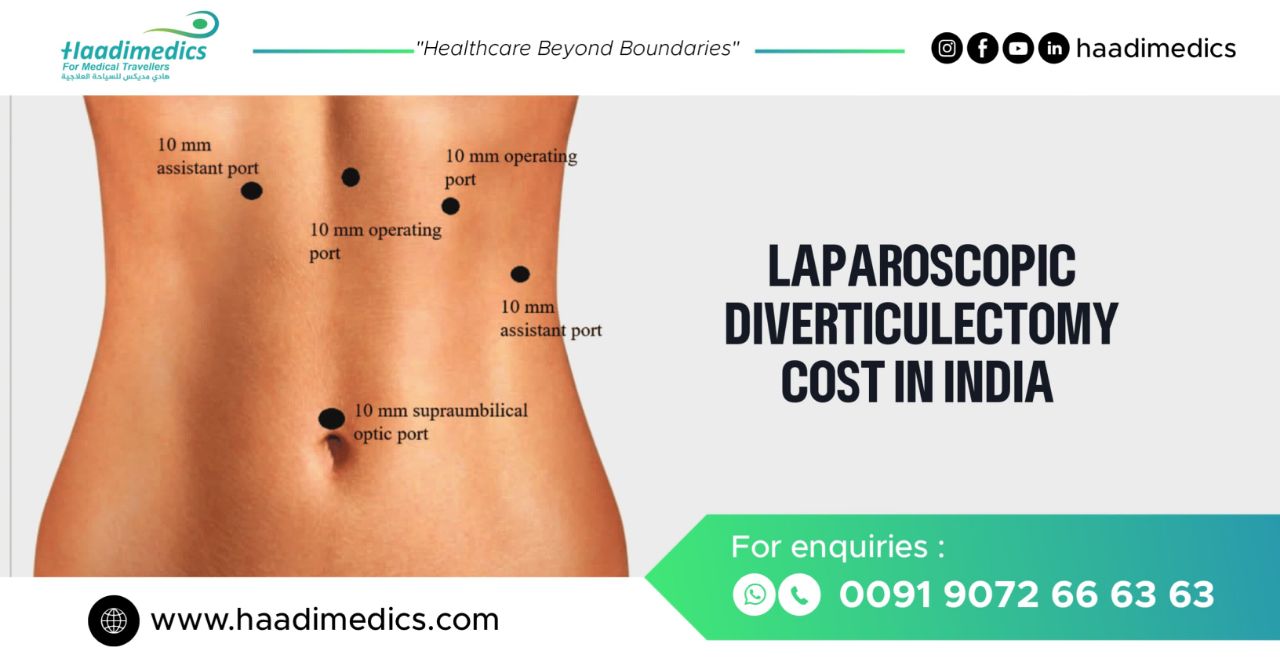India has a great legacy in Laparoscopic Diverticulectomy stems from its advanced medical infrastructure, skilled surgeons, and commitment to offering quality healthcare at competitive prices. With state-of-the-art facilities and expertise in laparoscopic surgery, India has become a preferred destination for patients seeking effective treatment for diverticula.
What is Laparoscopic Diverticulectomy?
Laparoscopic Diverticulectomy is a minimally invasive surgical procedure aimed at removing diverticula, which are small pouches that can develop in the walls of the digestive tract, typically in the colon. Infections or inflammation of these pouches can result gut illnesses like diverticulitis. Laparoscopic Diverticulectomy involves removing the affected portion of the colon to alleviate symptoms and prevent complications.
Why is it done?
Laparoscopic Diverticulectomy is performed to treat diverticulitis, a condition characterized by inflammation or infection of the diverticula. Diverticulitis can include fever, nausea, vomiting, altered bowel habits, and abdominal pain. If left untreated, diverticulitis can lead to complications such as abscess formation, perforation of the colon, or bowel obstruction, necessitating surgical intervention.
Risks
While Laparoscopic Diverticulectomy is considered safe, like any surgical procedure, it carries certain risks and potential complications. These may include bleeding, infection, injury to surrounding organs, post-operative pain, hernia formation, and adverse reactions to anesthesia. Patients should discuss these risks with their surgeon and address any concerns before undergoing the procedure.
Preparation
Preparation for Laparoscopic Diverticulectomy involves a comprehensive evaluation by a gastroenterologist or colorectal surgeon, including medical history review, physical examination, and possibly imaging studies such as CT scans or colonoscopy. Patients may be advised to stop certain medications, undergo bowel preparation to cleanse the colon, and refrain from eating or drinking before surgery.
Procedures
During Laparoscopic Diverticulectomy, the patient is placed under general anesthesia to ensure comfort and immobility. The surgeon makes small incisions in the abdomen and inserts a laparoscope, a thin tube with a camera and surgical instruments, to visualize the internal organs. The diverticulum is then identified and carefully excised from the colon. The incisions are closed and the healthy sections of the colon are rejoined. Laparoscopic Diverticulectomy offers several advantages over traditional open surgery, including shorter recovery time, reduced post-operative pain, and smaller scars.
Best Hospitals in India
- Medanta - The Medicity, Gurgaon
- Apollo Hospitals, Chennai
- Fortis Hospital, Mumbai
- Max Super Specialty Hospital New Delhi
- Kokilaben Dhirubhai Ambani Hospital, Mumbai
- Nanavati Max Hospital, Mumbai
- Global Hospital, Mumbai
Best Doctors for the Surgery
- Dr. Ajay Kumar Kriplani
- Dr. Manav Wadhawan
- Dr. Subhash Gupta
- Dr. Avnish Seth
- Dr. Sylesh Aikot
- Dr. Pankaj Dhawan
Top Nations in this Field
While India is a prominent destination for Laparoscopic Diverticulectomy, other countries such as the United States, Germany, the United Kingdom, and Singapore also excel in performing minimally invasive gastrointestinal surgeries and offer specialized care for diverticulitis patients.
Cost of Laparoscopic Diverticulectomy in India
India – USD 2030
FAQ
1. How long does recovery typically take after Laparoscopic Diverticulectomy?
The length of recovery varies according to the complexity of the surgery and personal characteristics. Generally, patients can expect to resume normal activities within 2 to 4 weeks, with full recovery achieved in about 6 weeks.
2. What are the main benefits of opting for laparoscopic surgery over traditional open surgery?
Laparoscopic surgery offers several advantages, including smaller incisions, reduced post-operative pain, shorter hospital stays, faster recovery, and minimal scarring compared to open surgery.
3. Are there any dietary restrictions to follow before or after Laparoscopic Diverticulectomy?
Before surgery, patients may be advised to follow a clear liquid diet or undergo bowel preparation to cleanse the colon. After surgery, a low-fiber diet may be recommended initially, followed by a gradual transition to a regular diet as tolerated.
4. What are the potential complications associated with Laparoscopic Diverticulectomy?
While Laparoscopic Diverticulectomy is generally safe, potential complications may include bleeding, infection, injury to surrounding organs, bowel obstruction, or hernia formation. These risks are minimized with proper surgical technique and post-operative care.
5. Will I experience pain after Laparoscopic Diverticulectomy, and how is it managed?
Some discomfort or pain at the incision sites is common after surgery but can be managed with pain medications prescribed by your healthcare provider. Most patients feel better in a matter of days.
6. How soon can I resume driving or return to work after Laparoscopic Diverticulectomy?
Patients should refrain from driving until they are no longer taking prescription pain medications and feel comfortable and alert behind the wheel. Return to work timing depends on individual recovery and job requirements, but most can resume within a few weeks.
7. Is Laparoscopic Diverticulectomy suitable for all patients with diverticulitis?
Laparoscopic Diverticulectomy is generally suitable for most patients with uncomplicated diverticulitis. However, individual factors such as overall health, severity of symptoms, and extent of diverticula may influence candidacy. Your surgeon will assess and determine the most appropriate treatment approach for you.
8. Will I need to undergo any follow-up procedures or tests after Laparoscopic Diverticulectomy?
Follow-up appointments with your surgeon are essential to monitor healing, address any concerns, and determine the need for additional tests or procedures. Periodic colonoscopies may also be recommended to assess the health of the colon.
9. Can Laparoscopic Diverticulectomy be performed on elderly patients or those with underlying health conditions?
Laparoscopic Diverticulectomy can be performed on elderly patients and those with underlying health conditions, provided they are medically stable and deemed suitable candidates for surgery. Your healthcare team will evaluate your individual health status and risks before proceeding with the procedure.
10. How can I prepare for Laparoscopic Diverticulectomy surgery, and what steps should I take post-operatively for a smooth recovery?
Before surgery, follow your surgeon's pre-operative instructions, including dietary restrictions, medication adjustments, and bowel preparation if necessary. After surgery, adhere to post-operative guidelines, including wound care, pain management, dietary recommendations, and activity restrictions, to promote optimal healing and recovery.


Comments